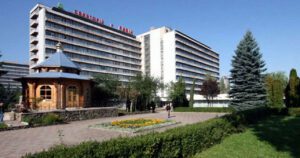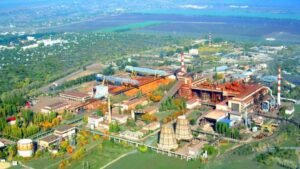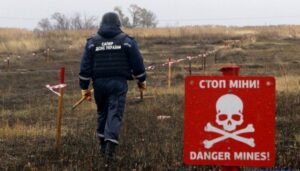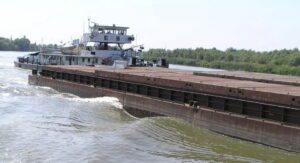
The buildings of the Truskavets sanatoriums “Rubin” and “Yantar” (Lviv region) will be modernized for housing for internally displaced persons (IDPs), the pro bono consultant of the Truskavets urban community on this project is the law firm Integrites, Interfax-Ukraine was informed in the press – service of the law firm.
“As part of the project, it is planned to modernize the buildings of the Rubin and Yantar sanatoriums with a total area of approximately 32 thousand square meters, located in the central part of the city of Truskavets, into houses with common premises (canteens, social centers). They were mothballed at the beginning of Russian aggression in 2014-2022,” Oleg Zagnitko, partner of Integrites, told the agency.
According to him, as a result, from 1.6 thousand to 3 thousand people. – both families and single persons will receive housing.
The project is proposed to be implemented on the basis of a public-private partnership (PPP) with the aim of integrating IDPs into the economy of the subregion. Integrites has been advising the city on the financial and management structure of PPPs since July 2022.
“We, as a company, represent a public partner – a city that solves its problems: it wants to revitalize the site in the center and integrate IDPs. and will remain as long as the property is empty,” Zagnitko explained.
Integrites is currently in the process of legal and financial structuring for the redevelopment and repurposing of several downtown buildings. This will make it possible to quickly revitalize the microdistrict in the resort subregion with the involvement of a number of resource sources.
The Truskavets project is part of the Rehousing Ukraine Initiative. The Affordable Housing Institute is a partnership between the Affordable Housing Institute, a non-profit organization registered in the United States, and Integrites, with the involvement of individual and institutional specialists where necessary. The IZH team is helping Ukraine recover from the Russian invasion and sees housing in general, and IDP shelters in particular, as the key to a fast, strong and modern recovery.
“We are honored to work with Truskavets Mayor Andriy Kulchinsky to realize his vision of converting a mothballed hotel into IDP housing. We see this not only as an urgent solution for Truskavets, but also as a prototype or pilot project to further scale similar conversions throughout Ukraine “, – commented the executive director of the Institute of Affordable Housing (USA), co-founder of IJU David Smith.
Earlier it was reported that in October 2022, the property of Truskavetskurort was seized as part of criminal proceedings regarding the alienation of property of real estate objects that were managed by the Federation of Trade Unions of Ukraine, PJSC Ukrprofzdravnitsa and PJSC Ukrproftur.
“As we see from the motivational part of the court’s ruling, the facilities may return to state ownership under the control of the Federation of Trade Unions. In this case, the implementation of PPP may be simplified, but holding a tender for the selection of a private partner will most likely require more time to prepare,” commented on the situation. Zagnitko.
He added that at this stage, the property will be administered by ARMA, but it will be a kind of PPP, since the management of real estate by the agency should be carried out “on the terms of efficiency, as well as maintaining (if possible, increasing) (…) the economic value” of real estate property, according to Art. 21(3) of the ARMA Act”.
The structure of PJSC “Truskavetskurort” includes sanatoriums “Spring”, “Crystal”, “Almaz”, “Yantar”, “Rubin”, “Birch” (all – Truskavets). The ultimate beneficiary is Pavel Yakubenko. The registered capital of PJSC is UAH 174.8 million.
According to the company’s data for 2019, its net profit amounted to UAH 91.9 million.

Oil prices rise on Wednesday on data from the American Petroleum Institute (API), which showed a sharp decline in US inventories.
The market is also supported by information from The Wall Street Journal and Bloomberg that Saudi Arabia fears Iranian attacks on facilities within the country, as well as in Iraq. This could lead to interruptions in oil supplies from the region and an increase in oil prices.
The cost of January futures for Brent crude on the London ICE Futures exchange by 8:10 pm on Wednesday is $95.73 per barrel, which is $1.08 (1.14%) higher than the closing price of the previous session. As a result of trading on Tuesday, these contracts rose by $1.84 (2%) to $94.65 per barrel.
The price of futures for WTI oil for December in electronic trading on the New York Mercantile Exchange (NYMEX) increased by this time by $1.2 (1.36%), to $89.57 per barrel. By the close of previous trading, the cost of these contracts rose by $1.84 (2.1%) to $88.37 per barrel.
U.S. oil inventories fell 6.53 million barrels in the week ended Oct. 28, after rising 4.52 million barrels a week earlier, according to API data released on Tuesday.
Official data on energy stocks in the United States will be released by the US Department of Energy on Wednesday at 17:30 square meters.
Experts surveyed by S&P Global Commodity Insights, on average, expect a decline in oil inventories last week by 1.6 million barrels, gasoline – by 1.9 million barrels, distillates – by 1 million barrels.

LLC Pobuzhsky Ferronickel Plant (PFC, Kirovograd region), which is part of the international investment group Solway, is forced to suspend production.
According to a press release from the company on Tuesday evening, as a result of the missile attack and global damage to the power grid, the company is unable to resume the operation of furnaces.
At the same time, it is specified that on the morning of October 22, the military forces of the Russian Federation carried out 3 missile strikes on an energy facility that provided power to the PFC, as well as a number of settlements in the Kirovograd and Nikolaev regions, including a water intake station on the Southern Bug (PS “Long Pristan” 35 kV).
As a result of power failure at PFC, the metallurgical process and water intake were stopped. PFC suffered significant economic damage, and production was forced to stop until the state-owned substation is properly restored and the necessary repairs to the main equipment are completed.
At the same time, the enterprise took all necessary measures to prevent situations that could have a negative impact on human health or the environment.
“Currently, power supply has been restored, but it is very unstable and barely enough for the needs of the population. Due to the impossibility of conducting the production process, the company is forced to suspend its main production activities,” the press release states.
The downtime start date is November 1, 2022.
It is also noted that since the beginning of the military aggression against Ukraine, the PFC has been operating at a loss due to high energy costs, logistical obstacles, lack of raw materials, and was subsidized by its Swiss investor Solway Investment Group, trying to fulfill its obligations to workers and the community as much as possible.
Given the forced decline in production by more than half, for 9 months of this year, the total volume of processed raw materials amounted to 0.643 million tons (62.8% compared to the results of 9 months 2021), which corresponds to 42.299 thousand tons of ferronickel (77.5% ) by 9 months-2021), or 7.4 thousand tons of nickel (63.5% by 9 months 2021).
During the specified reporting period, the plant paid taxes to the budget of Ukraine in the amount of UAH 113.8 million (7.9% more than in 9 months of 2021). Of these, UAH 56.1 million is a single social contribution (up 8.6% compared to 9 months 2021) and UAH 44 million are payroll taxes (up 9.1% compared to 9 months 2021).
According to the press release, despite the decline in production capacity with the start of full-scale armed aggression of the Russian Federation against Ukraine, wages and social benefits were maintained in full. In addition, with the participation of the parent company Solway, the employees of the plant carried out a complete set of first-aid kits for the military according to the standards of NATO and the Ministry of Health of Ukraine and established the process of purchasing and delivering the necessary funds and medical equipment from abroad. At present, the financial assistance of PFC and the Solway investment group in the acquisition of medical equipment for the Armed Forces of Ukraine amounted to about UAH 5 million.
The press service clarifies that during the period of downtime, jobs will be saved for all staff. Personnel involved in the maintenance and operation of critical infrastructure facilities and the protection of the plant’s facilities will be paid for the actual hours worked. In accordance with Article 113 of the Labor Code of Ukraine, employees who are not involved in the protection or operation of equipment will be paid for downtime in the amount of at least two thirds of the established tariff rate or salary.
“We remain on the ground and will try to keep the team, to be useful to society and the defenders of Ukraine for the sake of Our Victory,” says PFC General Director Denis Shevchenko, quoted by the press service.
During the period of forced downtime, PFC will continue to fulfill its social obligations to the society in terms of water supply, drainage, gas and heat supply.
Currently, PFC is fully integrated into the production process of Solway Investment Group. The total investment of the group in the plant amounted to more than $130 million.
International investment group Solway started its activity in 2002. It is a private company with a diversified business in the mining and metallurgical industries. The key companies of the group are registered in Switzerland, Luxembourg, Estonia and Malta. 100% of the share capital belongs to EU citizens. Solway’s main production assets are located in North Macedonia, Guatemala, Indonesia, Argentina and Ukraine.

The United States has launched a $47.6 million demining assistance project in Ukraine, the State Department said on Wednesday.
“September 30, the State Department provided $47.6 million to Tetra Tech, Inc. of Pasadena, California to provide emergency humanitarian mine clearance assistance to Ukraine,” the statement said.
Under the terms of the project, the company will “strengthen Ukraine’s ability to detect and clear landmines, unexploded and abandoned ordnance, improvised explosive devices and other explosive objects from civilian areas.”
In addition, Tetra Tech will provide Ukraine with the tools needed to carry out demining work.
This project is part of a $91.5 million demining assistance the State Department will provide over the coming year.

The opposition Likud party and its partners in Israel’s right-wing bloc may win a parliamentary majority in Israel’s parliamentary elections, The Jerusalem Post reports, citing polling results at the exit from polling stations.
Netanyahu’s bloc, which includes the Likud, the Religious Zionists, the single list of ultra-Orthodox parties Yahadut HaTorah and the ultra-religious Shas, can win 61 seats out of 120, according to exit polls. The Times of Israel predicts that the bloc Netanyahu will have 61-62 seats, Channel 12 predicts that the Netanyahu bloc will have 61 seats, Channel 13 – 62 seats, while the bloc of current Prime Minister Yair Lapid, according to the exit polls of these two channels, has 54-55 seats.
According to the Channel 12 exit poll, the Likud party, led by Netanyahu, could get 30 seats. According to the Channel 13 exit poll, Likud could win 31 seats. Lapid’s Yesh Atid party won 24 seats, according to exit polls from both channels.
However, the balance of power after the counting of all votes may still change, but the Israeli media is generally inclined to believe that, following the results of the current elections, Netanyahu may be able to regain power and become the head of government again. The final results will be known in the coming days, but by Wednesday morning, with the exception of some details, it will already be clear what the balance of power in the 25th Knesset will be, media say.
Polling stations in Israel closed at 22:00 (22:00 Kyiv time). The Israelis elected a new unicameral parliament, the Knesset.

The Ukrainian Danube Shipping Company (UDP) is launching the Danube Grain Route project due to the disruption of the “grain initiative” by Russia, UDP CEO Dmitry Moskalenko said on his Facebook page.
“Back in the summer, we assumed that Russia could at any moment try to disrupt the Grain Initiative. Therefore, we persistently and systematically developed our Danube Grain Route project,” Moskalenko explained.
According to him, UDP has invested in the creation of its own transshipment of grain and agreed with the Romanian partners – the TTS group of companies – on a faster and more efficient transshipment scheme in the port of Constanta.
Among the advantages of the new grain project at the first stage, Moskalenko noted that due to the faster loading and unloading process, the average caravan turnaround time will be reduced by about 30%. As a result, cargo owners will not have to bear financial losses due to long queues near the terminal.
In addition, the Director General of the UDP predicts that in the future the barge caravan will be able to carry out up to two trips per month due to the equipping of ships with online control systems, video surveillance and an increase in the number of navigators in the crew.
Moskalenko also said that at the second stage of the project, it is planned to build new barges, to increase the “tonnage” capabilities and modernize traction – a major overhaul of the self-propelled fleet with the replacement of engines.
As reported with reference to the data of the Ministry of Infrastructure of Ukraine, in just three months of the implementation of the Grain Initiative, 422 ships from Ukrainian seaports exported about 10 million tons of agricultural products. This volume could be 30-40% more if Russia did not block inspections in the Bosphorus.
On the afternoon of October 31, the press secretary of the Russian president, Dmitry Peskov, said that without the participation of the Russian Federation, the export of Ukrainian grain would hardly be feasible. At the same time, he noted that from now on the grain deal acquires a “risky and non-guaranteed character.”